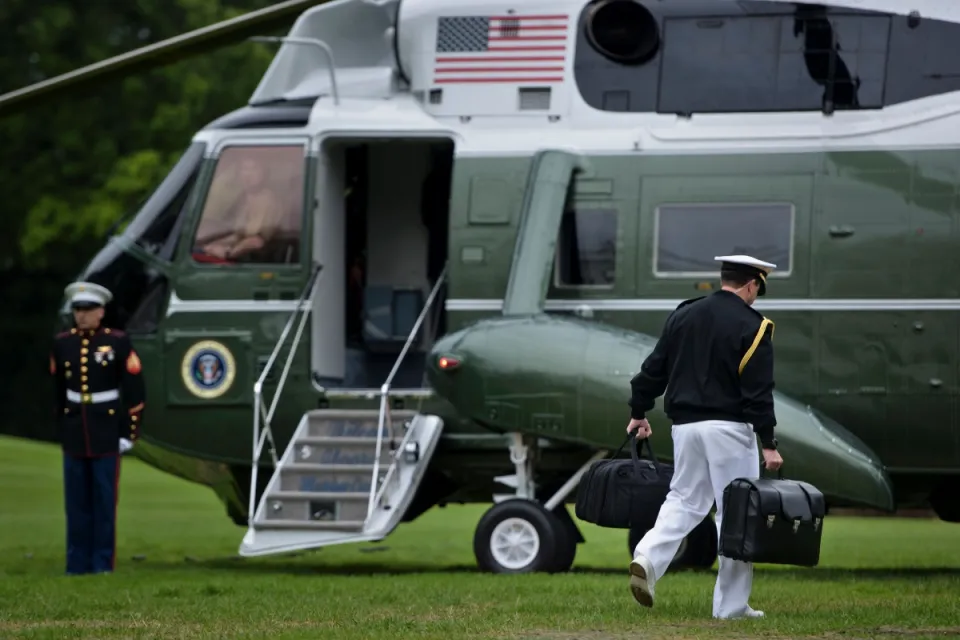By John Stapleton
In the early hours of this morning, prior to his inauguration, a brief business-like transaction took place at Blair House, the presidential guesthouse where President-elect Donald Trump will be spending the night.
Out of sight of television cameras, and with only a few people in attendance, he became the most powerful man on Earth, with the nuclear codes given to him and him alone.
His Secretary of Defence, Secretary of State and National Security Adviser can all be opposed to a nuclear attack on a foreign target, be it Beijing, Moscow, the Middle East or elsewhere, but nothing can stop Donald Trump if his mind is made up.
Without the pomp and circumstance that consumed much of the rest of the day, Trump, who in all likelihood will be in the company of his controversial new National Security Adviser Michael T. Flynn, will meet outgoing National Security Adviser Susan Rice.
Trump will be handed an object known as “the biscuit”, which closely resembles a plastic credit card.
This is the piece of technology, with a series of codes on it, which ties the nuclear codes to the President.
Related Coverage
In pictures: Donald Trump’s inauguration
Donald J. Trump inaugurated as 45th president
The speech: Donald Trump’s dark vision
He is the only one who can use them. No matter how good a likeness someone posing as the President may possibly appear, the biometric coding on “the biscuit” ensures that only one person on Earth can authorise the firing of America’s nuclear weapons.
The biscuit will remain either on or nearby Donald Trump for as long as he remains President.
It in turn unlocks “the football”, the briefcase which acts essentially as a nuclear command and control centre. It is carried by a military officer who remains in close proximity to the President at all times.
“The football” includes the so-called “Black Book”, which lists potential nuclear targets, strategies and scenarios.
Research Fellow at the US Studies Centre at Sydney University, Brendan Thomas-Noone, told The New Daily that despite the momentous symbolism of the moment, the actual event itself is straightforward: “The whole thing is over quickly. There is no pomp and ceremony. The handover does not include briefings on the ethicacy, morality or strategic use of nuclear weapons. It is a very mechanical moment.” Rain started falling as President Trump delivered his inaugural address. Photo: Getty
Rain started falling as President Trump delivered his inaugural address. Photo: Getty
Depending on your political perspective, the nuclear codes have just been handed to a reckless dilettante unfit to have them or the first person in many years bold enough to confront the US military industrial complex.
And despite the world’s nervousness at Trump the unknown quantity, some argue the nuclear codes are now in safer hands than if a known hawk like Hillary Clinton had won the election.
What is clear is the enormous power that now rests in the hands of Mr Trump.
“Many presidents have reported they are sobered by the experience and sense of responsibility,” Mr Thomas-Noone said. “They now have the power to kill millions of people. The immediacy of that power is a heavy burden.”
Depending on how they are counted, America has more than 1700 operational nuclear weapons.
Of its twelve nuclear powered ballistic submarines, at a minimum one or two of them are always on patrol, placing their nuclear weapons within easy reach of the world’s major cities.
If a President were to use the codes, in less than a quarter of an hour millions of people could be dying in Moscow, Beijing or elsewhere. At the same time, more than 400 Intercontinental Ballistic missiles could be launched from silos based on US soil, mostly in the mid-West.
These long-range missiles, with a speed of up to 15,000 miles per hour, can decimate populations thousands of kilometres away.
Whatever experience Mr Trump has had in business and life before today, nothing has prepared him – or for that matter any president before him – for the awesome power now in his hands.
